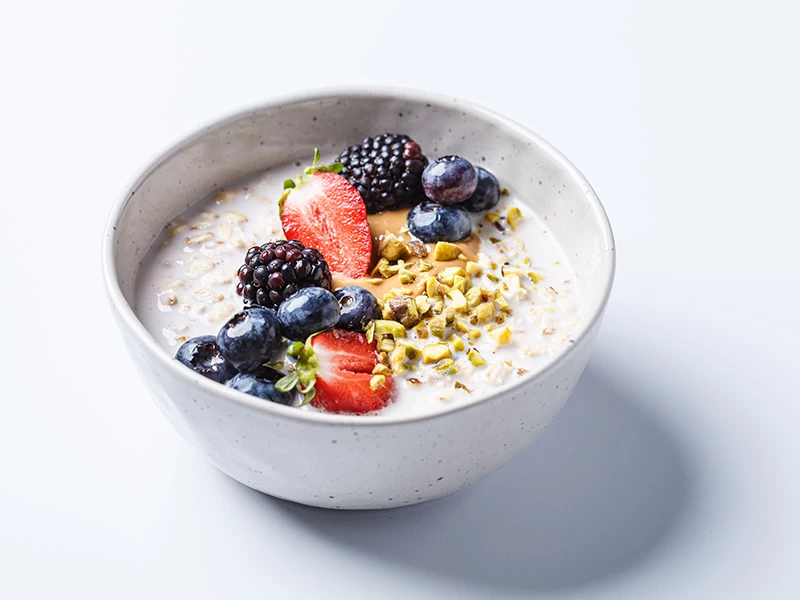In recent decades, oatmeal has become one of the most common and popular breakfast foods. This popularity is undoubtedly due to its pleasant taste, high nutritional value, and ease of preparation. Oatmeal, originally made from oats, is an ideal choice for those seeking healthy nutrition and maintaining daily energy. Its consumption has significantly increased among people who value exercise, weight loss diets, and a healthy lifestyle.
Oats, the main ingredient in oatmeal, are recognized as one of the most nutritious grains and offer numerous benefits. Therefore, oatmeal is considered a complete food and can be consumed at various meals such as breakfast, snacks, or even dinner. This article will thoroughly introduce oatmeal, its nutritional value, and its benefits.
Nutritional Information of Oatmeal
Oatmeal is derived from oat grains, available in whole or powdered form. Oats themselves contain high amounts of fiber, protein, vitamins, and minerals, making this product a healthy option for the diet. The high fiber content in oatmeal helps improve digestive function and reduce blood cholesterol levels.
Oatmeal is also a good source of complex carbohydrates that release energy gradually, preventing early hunger. This makes oatmeal an ideal breakfast for maintaining energy throughout the day. Additionally, oatmeal contains healthy fats that are beneficial for heart health.
Nutritional Value of Oatmeal
Besides fiber and protein, oatmeal contains vitamins such as B vitamins and minerals like magnesium, iron, and zinc. These vitamins and minerals help improve body metabolism, strengthen the immune system, and increase energy levels. Moreover, due to its antioxidants, oatmeal can protect cells from oxidative damage.
|
Nutritional Value of Oatmeal (100 grams) |
|
|
Calories |
389 |
|
Protein |
16.9g |
|
Fiber |
10.6g |
|
Fat |
6.9g |
|
Carbohydrates |
66g |
|
Magnesium |
177mg |
|
Iron |
4.7mg |
|
Thiamine (Vitamin B1) |
0.5mg |
Benefits of Consuming Oatmeal
One of the most important benefits of oatmeal is its long-lasting satiety. Due to its soluble fiber content, oatmeal is digested slowly, making one feel full for a longer period. This property is particularly beneficial for those looking to lose weight as it prevents the tendency to eat unhealthy snacks.

Oatmeal also plays a role in reducing LDL (bad) cholesterol levels and increasing HDL (good) cholesterol levels. Regular consumption of oatmeal can improve heart health and reduce the risk of heart diseases. Additionally, oatmeal can help control blood sugar levels, especially for those with diabetes or pre-diabetes.
7 Benefits of Consuming Oatmeal
Weight Control:
Oatmeal helps with weight loss due to its high fiber content. The fiber in oatmeal slows down digestion and creates a greater feeling of fullness, reducing appetite and the intake of extra calories. It also stabilizes blood insulin levels, preventing sudden spikes in blood sugar, which is effective in controlling appetite.
Heart Health:
The beta-glucan fiber in oatmeal reduces blood cholesterol levels. This fiber helps maintain heart health by reducing cholesterol absorption in the intestines. Regular consumption of oatmeal can reduce the risk of cardiovascular diseases. Additionally, the antioxidants in oatmeal help prevent inflammation and oxidative damage in the heart.
Blood Sugar Regulation:
Oatmeal, due to its complex carbohydrates, can help control blood sugar levels. This food is absorbed slowly, preventing severe fluctuations in blood sugar. For diabetics, consuming oatmeal can improve insulin sensitivity and better manage diabetes.
Digestive System Support:
Oatmeal, as a rich source of fiber, helps improve digestive system function. The fiber in oatmeal stimulates bowel movements and prevents constipation. It can also help maintain a balance of beneficial bacteria in the gut and prevent digestive diseases like irritable bowel syndrome.
Sustained Energy:
Oatmeal is an excellent source of complex carbohydrates that break down slowly in the body, providing sustained energy throughout the day. This feature is particularly beneficial for athletes and those with physical activity. Additionally, the protein in oatmeal helps maintain and repair muscles.
Cancer Prevention:
Some studies have shown that regular consumption of oatmeal can reduce the risk of various cancers, especially colon cancer. The fiber in oatmeal helps eliminate toxins and waste from the body and prevents chronic inflammation that can lead to cancer.
Immune System Boost:
Oatmeal, due to its vitamins and minerals like iron and zinc, can strengthen the immune system. These nutrients help produce immune cells and increase the body's resistance to infections and diseases. The antioxidants in oatmeal also help combat free radicals and enhance overall body health.
How to Consume Oatmeal

Oatmeal is easy to prepare and can be consumed in various ways. One common method is cooking it with water or milk. Oatmeal with milk has a more delicious taste and adds more protein to the meal. For more variety, oatmeal can be consumed with fresh fruits, nuts, or honey.
Oatmeal can also be consumed as a light snack or even a healthy dinner. Adding a bit of cinnamon, vanilla, or cocoa powder to oatmeal can give it new flavors and create a different culinary experience.
How to Prepare Oatmeal
To prepare homemade oatmeal simply, follow these steps:
- Pour half a cup of oats into a pot.
- Add one cup of water or milk.
- Bring the mixture to a boil and then reduce the heat.
- Stir gently for 5 to 7 minutes until the oatmeal thickens.
- Pour the oatmeal into a bowl and garnish with fruits or nuts as desired.
Conclusion
Oatmeal is a healthy, nutritious, and versatile food that can contribute to overall body health. The benefits of oatmeal include weight control, heart health maintenance, blood sugar regulation, and digestive system support. Additionally, it is an excellent option for diabetics and those looking to increase energy and reduce the risk of chronic diseases.
Frequently Asked Questions
- Who is oatmeal suitable for? Oatmeal is suitable for everyone, including athletes, diabetics, and those looking to lose weight.
- Does oatmeal cause weight gain? No, due to its high fiber content and long-lasting satiety, oatmeal can help with weight loss.
- Is oatmeal beneficial for diabetics? Yes, oatmeal helps regulate blood sugar levels and is suitable for diabetics.
- Can oatmeal be consumed as a snack? Yes, oatmeal can be consumed as a healthy snack.
- Does oatmeal need to be cooked? Yes, oatmeal usually needs to be cooked with water or milk.
- Does oatmeal help boost the immune system? Yes, the nutrients in oatmeal help strengthen the immune system.
- What can be added to oatmeal? Fresh fruits, nuts, honey, cinnamon, and cocoa powder can be added to oatmeal for better taste.





